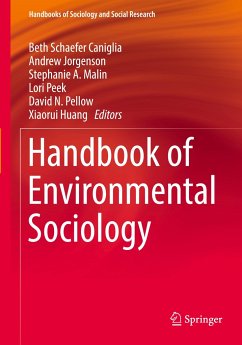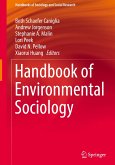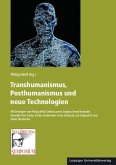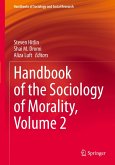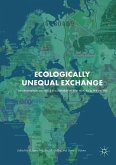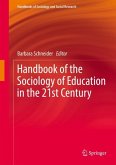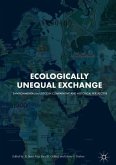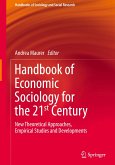Handbook of Environmental Sociology
Herausgegeben:Schaefer Caniglia, Beth; Jorgenson, Andrew; Malin, Stephanie A.; Peek, Lori; Pellow, David N.; Huang, Xiaorui
Handbook of Environmental Sociology
Herausgegeben:Schaefer Caniglia, Beth; Jorgenson, Andrew; Malin, Stephanie A.; Peek, Lori; Pellow, David N.; Huang, Xiaorui
- Broschiertes Buch
- Merkliste
- Auf die Merkliste
- Bewerten Bewerten
- Teilen
- Produkt teilen
- Produkterinnerung
- Produkterinnerung
This handbook defines the contours of environmental sociology and invites readers to push boundaries in their exploration of this important subdiscipline. It offers a comprehensive overview of the evolution of environmental sociology and its role in this era of intensified national and global environmental crises. Its timely frameworks and high-impact chapters will assist in navigating this moment of great environmental inequality and uncertainty. The handbook brings together an outstanding group of scholars who have helped redefine the scope of environmental sociology and expand its reach and…mehr
Andere Kunden interessierten sich auch für
![Handbook of Environmental Sociology Handbook of Environmental Sociology]() Handbook of Environmental Sociology241,99 €
Handbook of Environmental Sociology241,99 €![Transhumanismus, Posthumanismus und neue Technologien Transhumanismus, Posthumanismus und neue Technologien]() Transhumanismus, Posthumanismus und neue Technologien22,00 €
Transhumanismus, Posthumanismus und neue Technologien22,00 €![Handbook of the Sociology of Morality, Volume 2 Handbook of the Sociology of Morality, Volume 2]() Handbook of the Sociology of Morality, Volume 2185,99 €
Handbook of the Sociology of Morality, Volume 2185,99 €![Ecologically Unequal Exchange Ecologically Unequal Exchange]() Ecologically Unequal Exchange121,99 €
Ecologically Unequal Exchange121,99 €![Handbook of the Sociology of Education in the 21st Century Handbook of the Sociology of Education in the 21st Century]() Handbook of the Sociology of Education in the 21st Century186,99 €
Handbook of the Sociology of Education in the 21st Century186,99 €![Ecologically Unequal Exchange Ecologically Unequal Exchange]() Ecologically Unequal Exchange121,99 €
Ecologically Unequal Exchange121,99 €![Handbook of Economic Sociology for the 21st Century Handbook of Economic Sociology for the 21st Century]() Handbook of Economic Sociology for the 21st Century185,99 €
Handbook of Economic Sociology for the 21st Century185,99 €-
-
-
This handbook defines the contours of environmental sociology and invites readers to push boundaries in their exploration of this important subdiscipline. It offers a comprehensive overview of the evolution of environmental sociology and its role in this era of intensified national and global environmental crises. Its timely frameworks and high-impact chapters will assist in navigating this moment of great environmental inequality and uncertainty.
The handbook brings together an outstanding group of scholars who have helped redefine the scope of environmental sociology and expand its reach and impact. Their contributions speak to key themes of the subdiscipline-inequality, justice, population, social movements, and health. Chapter topics include environmental demography, food systems, animals and the environment, climate change, disasters, and much more. The emphasis on public environmental sociology and the forward-thinking approach of this collection is what sets this volume apart.
This handbook can serve as an introduction for students new to environmental sociology or as an insightful treatment that current experts can use to further their own research and publication. It will leave readers with a strong understanding of environmental sociology and the motivation to apply it to their work.
The handbook brings together an outstanding group of scholars who have helped redefine the scope of environmental sociology and expand its reach and impact. Their contributions speak to key themes of the subdiscipline-inequality, justice, population, social movements, and health. Chapter topics include environmental demography, food systems, animals and the environment, climate change, disasters, and much more. The emphasis on public environmental sociology and the forward-thinking approach of this collection is what sets this volume apart.
This handbook can serve as an introduction for students new to environmental sociology or as an insightful treatment that current experts can use to further their own research and publication. It will leave readers with a strong understanding of environmental sociology and the motivation to apply it to their work.
Produktdetails
- Produktdetails
- Handbooks of Sociology and Social Research
- Verlag: Springer / Springer International Publishing / Springer, Berlin
- Artikelnr. des Verlages: 978-3-030-77714-2
- 1st edition 2021
- Seitenzahl: 544
- Erscheinungstermin: 3. November 2022
- Englisch
- Abmessung: 254mm x 178mm x 30mm
- Gewicht: 1011g
- ISBN-13: 9783030777142
- ISBN-10: 3030777146
- Artikelnr.: 65999630
- Herstellerkennzeichnung Die Herstellerinformationen sind derzeit nicht verfügbar.
- Handbooks of Sociology and Social Research
- Verlag: Springer / Springer International Publishing / Springer, Berlin
- Artikelnr. des Verlages: 978-3-030-77714-2
- 1st edition 2021
- Seitenzahl: 544
- Erscheinungstermin: 3. November 2022
- Englisch
- Abmessung: 254mm x 178mm x 30mm
- Gewicht: 1011g
- ISBN-13: 9783030777142
- ISBN-10: 3030777146
- Artikelnr.: 65999630
- Herstellerkennzeichnung Die Herstellerinformationen sind derzeit nicht verfügbar.
Beth Schaefer Caniglia (PhD University of Notre Dame) is Executive Director of Earth, Incorporated and Editor-in-Chief of the Solutions Journal. Dr. Caniglia's research and publications are focused at the intersection of resilience and environmental justice in urban communities. Dr. Caniglia is past-Chair of the Environment & Technology Section of the American Sociological Association. She has received numerous awards. In 2009, she was chosen as a Global Climate Leader by the State of the World Forum in recognition of her commitment to link academic scholarship to global carbon cycle transformation. In 2016, she was recognized by the International Women's Leadership Association as among Top Women Executives, Professionals & Entrepreneurs. Her book (with Thomas J. Burns) Environmental Sociology: The Ecology of Late Modernity was honored with the Gerold L. Young Outstanding Book Award from the Society for Human Ecology. She has been honored by America's Who's Who in Academia and was selected to serve as a Research Fellow for the Wellbeing Economy Alliance. Dr. Caniglia was most recently honored to be selected as a Propeller Impact Accelerator awardee in her new home of New Orleans. Andrew Jorgenson is Professor and Chair in the Department of Sociology and Professor of Environmental Studies at Boston College. Working in the areas of environmental sociology, global political economy, the sociology of development, and sustainability science more broadly, he conducts research on the human dimensions of global environmental change, with a focus on how development, inequality, and the structure of global production and trade networks contribute to greenhouse gas emissions, industrial pollution, land cover change, and relationships between environmental conditions and population health. In 2020, he received the Fred Buttel Distinguished Contribution Award from the American Sociological Association'sSection on Environmental Sociology for his innovation, publication, and service in the field of environmental sociology. Andrew's published research has received awards from the American Sociological Association, the Pacific Sociological Association, and the British Sociological Association. His published work appears in various disciplinary and interdisciplinary journals, including American Journal of Sociology, Nature Climate Change, Social Forces, Environmental Research Letters, Social Problems, Science of the Total Environment, Sociological Science, Sustainability Science, Sociological Theory, WIREs Climate Change, Ecological Economics, Energy Policy, Climatic Change, Global Environmental Politics, and Energy Research and Social Science. He is coauthor of Super Polluters: Tackling the World'sLargest Sites of Climate-Disrupting Emissions, published by Columbia University Press in 2020. Andrew was the 2016-2017 Chair of the Environmental Sociology Section and the 2018-2019 Chair of the Sociology of Development Section of the American Sociological Association. Stephanie A. Malin, Ph.D. is an environmental sociologist specializing in natural resource sociology, governance, and rural development, with a focus on the community impacts of resource extraction and energy production. Her main interests include environmental justice, environmental health, social mobilization, and the socio- environmental effects of market-based economies. She also examines communities building more distributive and regenerative systems. Stephanie serves as an Associate Professor in the Department of Sociology at Colorado State University and she is an adjunct Associate Professor with the Colorado School of Public Health. Stephanie co-founded and co-directs the Center for Environmental Justice at CSU. She is an award-winning teacher of courses on environmental justice, water and society, and environmental sociology. Stephanie has authored a forthcoming book, Changing it All: Using Environmental Sociology to Build Something Better, as well as The Price of Nuclear Power: Uranium Communities and Environmental Justice, and has published her research in journals such as Social Forces, Environmental Politics, the Journal of Rural Studies, and Society and Natural Resources. Stephanie conducts public sociology and engaged scholarship, and her work can additionally be found in news outlets like The Conversation and High Country News' Writers on the Range. Her work has been supported by grants from the National Institutes of Environmental Health Sciences (part of National Institutes of Health), the American Sociological Association, the Rural Sociological Society's Early Career Award, and the CSU Water Center. Stephanie has enjoyed serving in elected leadership positions for the American Sociological Association's Section on Environmental Sociology and the International Association for Society and Natural Resources. She completed a Mellon Foundation Postdoctoral Fellowship at Brown University after earning her Ph.D. in Sociology from Utah State University. Lori Peek is Professor in the Department of Sociology and Director of the Natural Hazards Center at the University of Colorado Boulder. She studies marginalized populations in disaster and is author of Behind the Backlash: Muslim Americans after 9/11, co-editor of Displaced: Life in the Katrina Diaspora, and co-author of Children of Katrina. Peek also helped develop and write school safety guidance for the United States, which resulted in the publication of FEMA P-1000, Safer, Stronger, Smarter: A Guide to Improving School Natural Hazard Safety. Peek is the principal investigator for the National Science Foundation-funded CONVERGE facility, which is dedicated to improving research coordination and advancing the ethical conduct and scientific rigor of disaster research. She also leads the NSF-supported Social Science Extreme Events Research (SSEER) and Interdisciplinary Science and Engineering Extreme Events Research (ISEEER) networks. Peek is past President of the International Sociological Association Research Committee on Disasters and past Chair of the American Sociological Association Section on Environmental Sociology. She is a Board Member for the Bill Anderson Fund, which is an initiative dedicated to increasing the number of persons of color in hazards mitigation and disaster research. Peek received her Ph.D. in Sociology from the University of Colorado Boulder in 2005. David N. Pellow is the Dehlsen Chair and Professor of Environmental Studies and Director of the Global Environmental Justice Project at the University of California, Santa Barbara where he teaches courses on social change movements, environmental justice, human-animal conflicts, sustainability, and social inequality. He has published a number of works on environmental justice issues in communities of color in the U.S. and globally. His books include: What is Critical Environmental Justice? (Polity Press, 2017); Keywords for Environmental Studies (editor, with Joni Adamson and William Gleason, New York University Press, 2016); Total Liberation: The Power and Promise of Animal Rights and the Radical Earth Movement (University of Minnesota Press, 2014); The Slums of Aspen: Immigrants vs. the Environment in America's Eden (with Lisa Sun-Hee Park, New York University Press, 2011); The Treadmill of Production: Injustice and Unsustainability in the Global Economy (with Kenneth Gould and Allan Schnaiberg, Paradigm Press, 2008); Resisting Global Toxics: Transnational Movements for Environmental Justice (MIT Press, 2007); The Silicon Valley of Dreams: Environmental Injustice, Immigrant Workers, and the High-Tech Global Economy (with Lisa Sun-Hee Park, New York University Press, 2002); Garbage Wars: The Struggle for Environmental Justice in Chicago (MIT Press, 2002); Urban Recycling and the Search for Sustainable Community Development (with Adam Weinberg and Allan Schnaiberg, Princeton University Press, 2000); Power, Justice, and the Environment: A Critical Appraisal of the Environmental Justice Movement (editor, with Robert J. Brulle, MIT Press, 2005); and Challenging the Chip: Labor Rights and Environmental Justice in the Global Electronics Industry (co-editor, with Ted Smith, David Sonnenfeld, and Leslie Byster, Temple University Press, 2006). He has consulted for and served on the Boards of Directors of several community-based, national, and international organizations that are dedicated to improving the living and working environments for people of color, immigrants, Indigenous peoples, and working class communities, including the Central Coast Climate Justice Network, Community Environmental Council, Global Action Research Center, the Center for Urban Transformation, Greenpeace USA, International Rivers, Community Environmental Council, the Fund for Santa Barbara, the Prison Ecology Project. He earned his B.A. in Sociology and Religious Studies at the University of Tennessee, Knoxville in 1992. He earned his M.A. and Ph.D. in Sociology from Northwestern University in 1998. Xiaorui Huang is a doctoral candidate in the Department of Sociology at Boston College. His research focuses on environmental sociology, global political economy, the sociology of development, and sustainability science. Much of his research examines the environmental impacts of political economic and social forces including international trade, world economic conditions and cycles, and income inequality. His published work appears in journals such as Social Science Research, Climatic Change, Sociological Forum, Sociology of Development, Ecological Economics, Energy Research and Social Science, Environmental Research, Science of the Total Environment, and Human Ecology Review.
Chapter 1. Introduction: A 21st Century Public Environmental Sociology (Beth Schaefer Caniglia).- Part I: Inequality, Political Economy, and Justice.- Chapter 2. Intersectionality and the Environment (Christina Ergas).- Chapter 3. Environmental Justice (Rebecca Maung).- Chapter 4. Ecologically Unequal Exchange and Environmental Load Displacement (Jennifer E. Givens).- Chapter 5. Consumption (Annika Rieger).- Chapter 6. Corporations and the Environment (Simone Pulver).- Chapter 7. Just Transitions and Labor (Erik Kojola).- Part II: Energy, Climate, and Health.- Chapter 8. Sociology of Energy(Stephanie A. Malin).- Chapter 9. Risk (Alissa Cordner).- Chapter 10. Sociology and Climate Change (Danielle Falzon).- Chapter 11. Sociology of Disasters (Lori Peek).- Chapter 12. Environmental Factors in Health (Elisabeth Wilder).- Chapter 13. Food Insecurity (Dorceta E. Taylor).- Part III: Culture, the State, and Institutions.- Chapter 14. Animals in Environmental Sociology (Linda Kalof).- Chapter 15. Religion and the Environment (Lynn Hempel).- Chapter 16. Environmental Governance (Dana R. Fisher).- Chapter 17. Green Criminology (Michael J. Lynch).- Chapter 18. War and the Environment (Michael R. Lengefeld).- Part IV: Population, Place, and Possibilities.- Chapter 19. Environmental Demography (Lori M. Hunter ).- Chapter 20. Land Use and Land Use Change (Thomas K. Rudel).- Chapter 21. Structural Human Ecology (Thomas Dietz).- Chapter 22. Environmental Science and Technology Studies (Scott Frickel).- Chapter 23. Towards an Indigenous Environmental Sociology (Kari Marie Norgaard).- Chapter 24. Environmental Movements in the United States (Erik W. Johnson).- Chapter 25. Socio-Ecological Systems (Beth Schaefer Caniglia).
Chapter 1. Introduction: A 21st Century Public Environmental Sociology (Beth Schaefer Caniglia).- Part I: Inequality, Political Economy, and Justice.- Chapter 2. Intersectionality and the Environment (Christina Ergas).- Chapter 3. Environmental Justice (Rebecca Maung).- Chapter 4. Ecologically Unequal Exchange and Environmental Load Displacement (Jennifer E. Givens).- Chapter 5. Consumption (Annika Rieger).- Chapter 6. Corporations and the Environment (Simone Pulver).- Chapter 7. Just Transitions and Labor (Erik Kojola).- Part II: Energy, Climate, and Health.- Chapter 8. Sociology of Energy(Stephanie A. Malin).- Chapter 9. Risk (Alissa Cordner).- Chapter 10. Sociology and Climate Change (Danielle Falzon).- Chapter 11. Sociology of Disasters (Lori Peek).- Chapter 12. Environmental Factors in Health (Elisabeth Wilder).- Chapter 13. Food Insecurity (Dorceta E. Taylor).- Part III: Culture, the State, and Institutions.- Chapter 14. Animals in Environmental Sociology (Linda Kalof).- Chapter 15. Religion and the Environment (Lynn Hempel).- Chapter 16. Environmental Governance (Dana R. Fisher).- Chapter 17. Green Criminology (Michael J. Lynch).- Chapter 18. War and the Environment (Michael R. Lengefeld).- Part IV: Population, Place, and Possibilities.- Chapter 19. Environmental Demography (Lori M. Hunter ).- Chapter 20. Land Use and Land Use Change (Thomas K. Rudel).- Chapter 21. Structural Human Ecology (Thomas Dietz).- Chapter 22. Environmental Science and Technology Studies (Scott Frickel).- Chapter 23. Towards an Indigenous Environmental Sociology (Kari Marie Norgaard).- Chapter 24. Environmental Movements in the United States (Erik W. Johnson).- Chapter 25. Socio-Ecological Systems (Beth Schaefer Caniglia).

